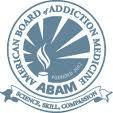Five Hundred Thirty-Seven New Diplomates Certified by American Board of Addiction Medicine

Overview
Originally Published: 06/12/2013
Post Date: 06/15/2013
Summary/Abstract
American Board of Addiction Medicine (ABAM) was proud to honor and recognize 537 physicians who achieved board certification in addiction medicine. The new ABAM diplomates join 2,557 physicians in the United States who have already been certified and awarded diplomate status by ABAM, an independent medical specialty board.
Content
Five Hundred Thirty-Seven New Diplomates Certified by American Board of Addiction Medicine
The American Board of Addiction Medicine (ABAM) was proud to honor and recognize 537 physicians who achieved board certification in addiction medicine during the organization’s recent annual awards luncheon in Chicago, IL. The new ABAM diplomates join 2,557 physicians in the United States who have already been certified and awarded diplomate status by ABAM, an independent medical specialty board
Chicago, Illinois (PRWEB) June 12, 2013
The American Board of Addiction Medicine (ABAM) was proud to honor and recognize 537 physicians who achieved board certification in addiction medicine during the organization’s recent annual awards luncheon in Chicago, IL. The new ABAM diplomates join 2,557 physicians in the United States who have already been certified and awarded diplomate status by ABAM, an independent medical specialty board.
ABAM certifies addiction medicine physicians from all medical specialties, including emergency medicine, family medicine, internal medicine, obstetrics and gynecology, pediatrics, preventive medicine, psychiatry, neurology and surgery. Prior to the establishment of ABAM, psychiatrists were the only specialists who had addiction-related board certification available to them. ABAM also sets standards for physician education, assesses physicians’ knowledge, and requires and tracks Maintenance of Certification through life-long continuous education.
“We want addiction prevention, screening, intervention and treatment to become routine aspects of medical care, available virtually any place health care is provided,” said Jeffrey Samet, MD, President of the American Board of Addiction Medicine.
One in five Americans entering the health care system has a substance abuse problem. The American Board of Addiction Medicine is the only medical specialty board that both draws from all areas of medicine and is dedicated to certifying addiction specialists. By seeking ABAM-certified addiction physician specialists, patients have a way to find specialized medical care for substance use disorders related to alcohol, tobacco and other addicting drugs, including some prescription medications.
“Physicians are often at a loss for what to do about substance use and addiction issues, and may even misdiagnose the problem,” said Dr. Samet. “We hope to change this by creating a cadre of thousands of specialized physicians across medical specialties.”
Studies show that fewer than one in five physicians consider themselves adequately prepared to diagnose alcoholism or other drug use disorders. Physician training is sorely lacking. Separate courses in addiction medicine are rarely taught in medical school, and there are no addiction medicine residencies among the 8,200 American Council for Graduate Medical Education (ACGME) accredited residency programs in the nation’s hospitals.
“The American Board of Addiction Medicine provides assurance to the American public that addiction medicine physicians have the knowledge and skills to prevent, recognize and treat addiction,” said Dr. Samet. “ABAM-certified physicians will also be able to address common medical or psychiatric conditions related to the use of addictive substances.”
Created in 2007, with the encouragement of the American Society of Addiction Medicine, ABAM offers a rigorous certifying examination that was developed by an expert panel and the National Board of Medical Examiners, as well as annual Maintenance of Certification requirements to ensure that ABAM-certified physicians maintain life-long competence in addiction medicine.
ABAM has a governing body of 15 distinguished physicians from across a range of medical specialties, each of whom is certified by a member board of the American Board of Medical Specialties (ABMS). ABAM is in the process of seeking recognition from ABMS, and plans to certify physicians in multiple specialties. ABAM has taken steps to assist in the creation of addiction medicine training programs affiliated with the nation’s top medical schools. Eighteen of these programs are now accredited by The ABAM Foundation.
ABAM was created at a time of increasing promise for addiction treatment. Recent discoveries have added to the preponderance of evidence that addiction is a chronic disease of the brain, with unique vulnerabilities and pathology, and a predictable course if not interrupted by effective treatment. An increasing number of medically based addiction treatments have become available, and more are on the horizon.
“Years of scientific research have proven drug addiction is a brain disease caused by biological, environmental and developmental factors—a disease which can have far reaching medical consequences,” said Nora D. Volkow, MD, Director of the National Institute on Drug Abuse. “Given the proper training, tools, and resources, physicians can be the first line of defense against substance abuse and addiction--identifying drug use early, preventing its escalation to abuse and addiction, and referring patients in need to treatment.”
Congress passed legislation that addresses insurance discrimination against those with addictions, requiring that private insurance coverage of addiction treatment, when provided, is offered in the same way that all other medical and surgical coverage is provided. Expanded coverage and demand for addiction medicine physicians will increase, as 30 million formerly uninsured Americans become covered under the Patient Protection and Affordable Care Act.
“Now that these barriers have been reduced, we want to make sure that evidence-based addiction treatment is available to all who need it,” said Dr. Samet.





